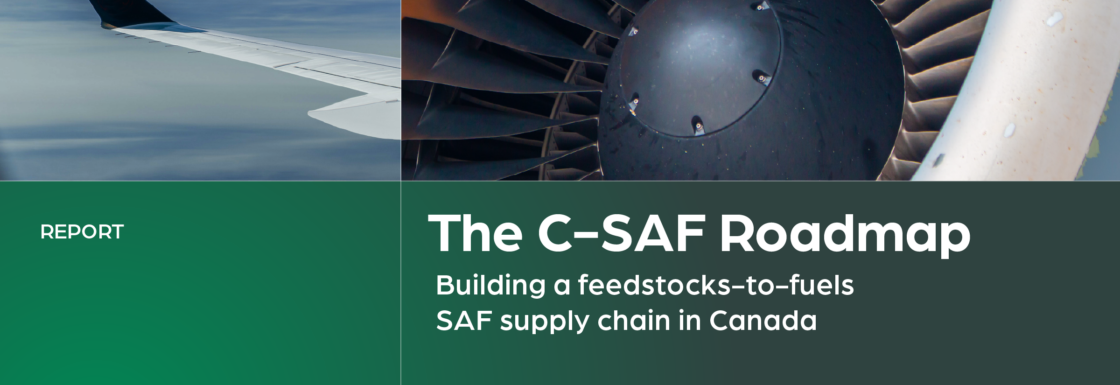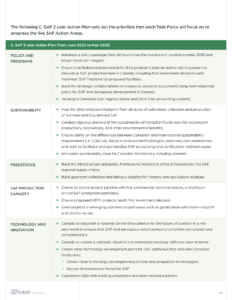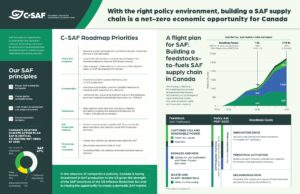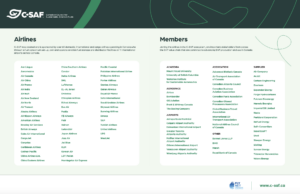Canada’s first Sustainable Aviation Fuels Roadmap

Projects Sponsor
C-SAF, The Energy Futures Lab and The Transition Accelerator partnered to create the Sustainable Aviation Fuel Roadmap to provide the plan we need to reach the lofty goal of a Net Zero aviation industry.
While Canada’s Aviation Climate Action Plan sets out a vision for achieving net-zero emissions by 2050, and an aspirational target of 10% sustainable aviation fuel (SAF) use by 2030, it doesn’t identify clear actions, priorities, or policies required to make that aspiration a reality. Luckily, C-SAF, the Canadian Council for Sustainable Aviation Fuels, is here to fly clean over that gap.

C-SAF Roadmap is a debut mission in their campaign to catalyse an ecosystem to support SAF production and use in Canada, and is the first of its kind in the nation. It charts a clear flightpath to producing a billion litres of sustainable aviation fuel by 2030 (representing a savings of more than one and a half million tonnes of GHG emissions) and identifies a clear strategy to create a Canadian SAF market.
The roadmap is designed to align the whole supply chain from upstream resources and capacities to downstream users and markets. By creating clear timelines and action sequences, the map works to turn lofty goals into the practical investment and action necessary to rapidly build and scale the SAF industry in Canada. And that is very necessary work indeed. All studies have concluded that SAF plays a large and critical role in decarbonizing aviation, representing between 60 to 75% of the 2050 emissions reductions solutions on the way to net-zero.
C-SAF in partnership with the Energy Futures Lab and The Transition Accelerator got the Roadmap project off the ground by forming a technical committee of experts drawn from firms, industry associations, and consultancies from C-SAF members, initiating a multi-stage process of consultations, workshops, and analysis. Initial one-on-one interviews broke the broad issue down into five specific action areas:
- Feedstock: What will it take to produce sustainable inputs and bring them into the SAF supply chain?
- Production Capacity: What capacity is needed to meet the SAF targets?
- Technology: What technological advances are going to be necessary to produce volumes and remain competitive?
- Sustainability: How can carbon intensity scores be kept low and the long-term viability of feedstocks be ensured, all while preserving biodiversity and other ecosystem values?
- Policy and Programs: What policy packages are needed to incentivize the investment and production necessary to achieve all these goals?
From there, a series of workshops over the course of a year addressed the three critical questions for each action area.
- What does success in this area look like in 2030?
- What should C-SAF and partners try to accomplish in the period 2022-2025?
- What is the current state of play in the industry and what can be done to drive change?
Once the problem had been broken down, it was time to put everything together. Analytical work was done to develop and prove the ideas, which were further confirmed and tested out with the technical committee and from all this, the SAF Roadmap was drawn.

Released on June 5, 2023, the C-SAF roadmap has since allowed the Canadian SAF ecosystem to coalesce around a focused strategy that creates a platform to work with the government to explore and develop a package of policies to support SAF production in Canada. By taking a broad goal and turning it into a practical series of actions, the Roadmap will not only reduce project risks but also articulates the sustainability case for Canadian feedstocks, and coordinates with broader overall aviation decarbonization strategies.

Even the sky is not the limit; the Roadmap is now a key document used by Transport Canada as they develop a decarbonization blueprint for all transportation in Canada and for Natural Resources Canada as they develop a renewable fuels incentive package. The aviation sector absolutely requires sustainable fuels to reach 2050’s net-zero goals. And the world needs the aviation sector. Completing the actions as recommended in C-SAF’s Roadmap will help us depart the gate on time.













